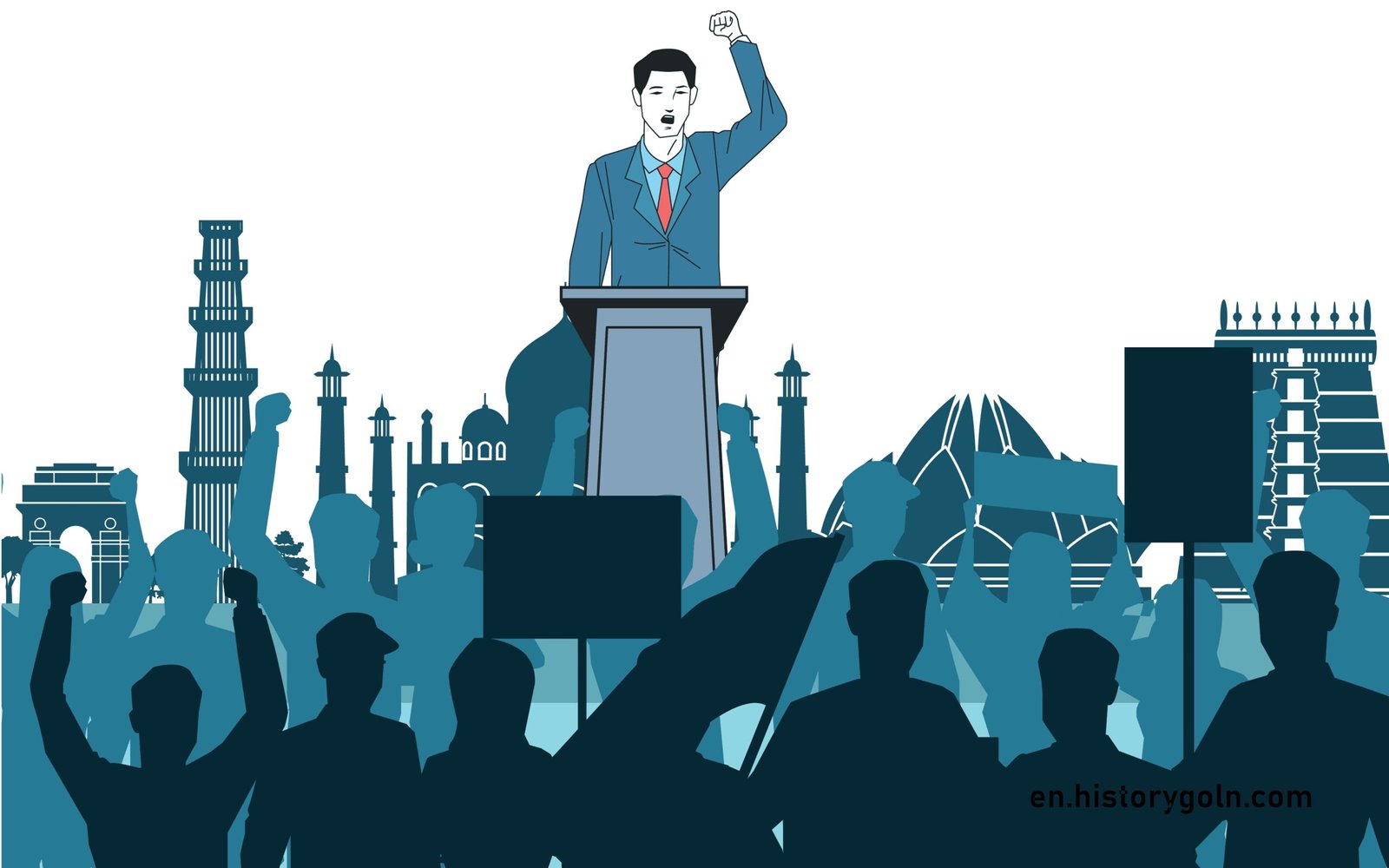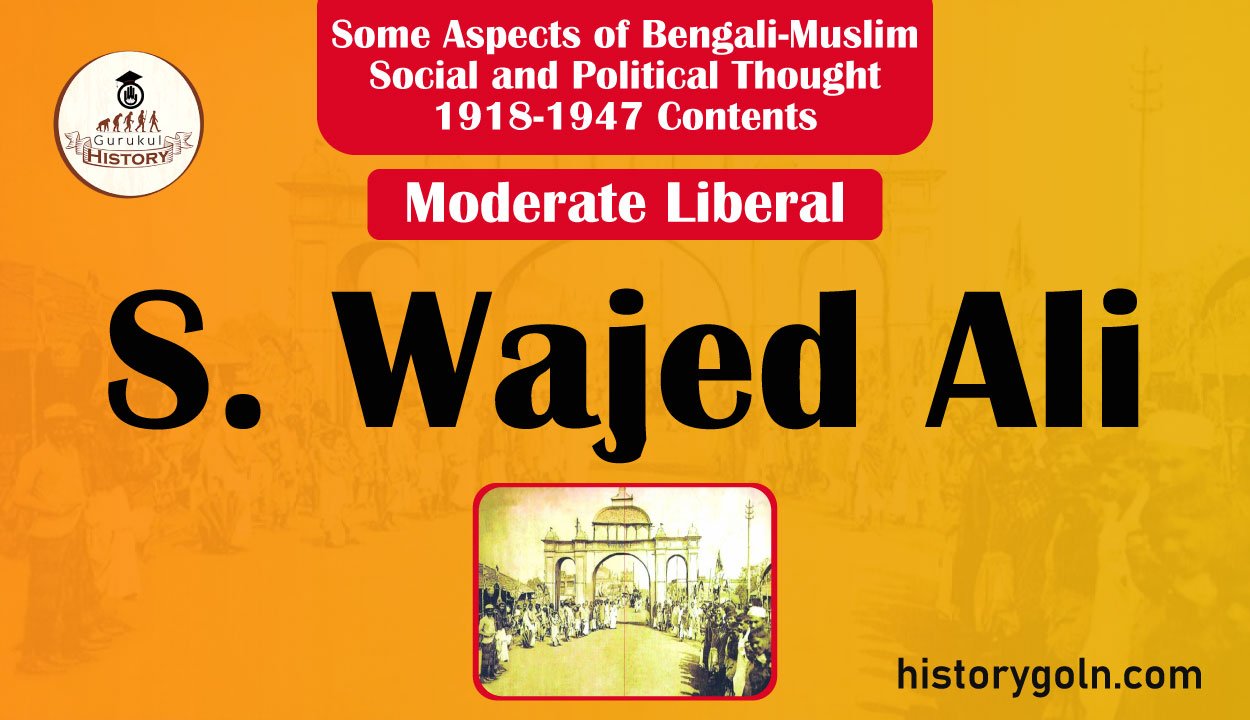Today is our topic of discussion S. Wajed Ali .
S. Wajed Ali

With the emergence of a Muslim middle class in Bengal by the 1920’s a group of young Muslims had begun seriously to think about the upliftment of their community through social and economic reforms. S. Wajed Ali was more concerned with finding a suitable political basis for the Bengali- speaking Muslims and their soical and economic development.
S. Wajed Ali was born on 4 September, 1890 in the village of Borotazpur in the district of Hooghly under Srirampur subdivision in West Bengal. He fell a victim to the custom of early marriage and was married at the age of seven 2 He was educated in English medium at Shillong where his father was employed. After passing Matriculation (Entrance) examination, he was admitted to the Aligarh Mahommedan Anglo-Oriental College.
He passed his Intermediate in 1908 and got his Bachelor’s degree in 1910. At Aligarh he studied Sanskrit and Urdu but felt that as a Bengali he must learn his mother tongue.3 For two years between 1910-1912 he stayed at Shillong with his wife. In 1912 he left for England to study Bar-at-Law at Cambridge University.
There he married Nelly, a girl from Bristol.5 In 1915 he returned to Calcutta with his second wife and was involved in law profession until 1922. In 1923 he was appointed magistrate and started writing articles and stories and also doing some translation works.6 During this time his second wife left him. He married for the third time a Burmese girl of royal family.
In 1931 his third wife died. S. Wajed Ali retired from his job as magistrate in 1945 and started his law profession again. In 1949 he was paralysed and remained bed-ridden for two years. He died in Calcutta on 10 June, 1951.
S. Wajed Ali started writing in the 1920’s with a conscious feeling and a practical political insight for social upliftment of the Bengali Muslim society. He advocated the formation of an autonomous state which would include the Bengali speaking regions. As early as the 1930’s he proposed that language was to be the basis of such territorial unit. In the midst of diversity in India, a unity had to be sought and maintained.
To S. Wajed Ali a federation of states of India, based on linguistic affinity was the only possible means to keep India united and at the same time allow the various racial and linguistic groups to maintain separate existence,
S. Wajed Ali was a didactic writer who believed in art for life’s sake. His writings were published in various journals such as the Gullstan, Shabuj Patra, Bangabani, Bharati, Saogat, Shahityk, the Monthly Mohammadi between 1919 and 1945.
Most of his writings stressed the need for education, economic improvement and rational analysis of the Quranic scriptures 10 In his early writings he had expressed that religion was the most important factor in a man’s life and that the culture of the Bengali Muslims was to be based on their religion.11 In his later writings he modified his opinion and stressed on developing a Bengali culture from a secular point of view.
Ideas of the Muslim thinkers in the late nineteenth and early twentieth centuries were mostly concerned with religious matters, particularly, past glory of Islam and connection of Indian Muslims with the Islamic world.
To most of them Islamic culture, however, meant non-Indian and non-Bengali Muslim culture. Abdur Rahim (1859-1931), Mohammad Reazuddin Ahmed (1862-1933) and Syed Ismail Hossain Shiraji (1880-1931) were Pan- Islamists and believed in maintaining a religious code of life according to the Shariah (principles of Islam).
S. Wajed Ali, on the contrary, gave importance to education, economic development and tolerance to other religious communities. These, according to him were the pre-requisites for the development of the Bengali Muslims. S. Wajed Ali directed his writings against the conservatism existing among most Bengali Muslims and the orthodoxy of the maulvis. He spoke strongly against religious fanaticism, which he pointed out, hindered communal harmony in the province.
S. Wajed Ali attempted to make the Bengali Muslims conscious of their shortcomings and the necessity to promote their socio-political and economic development. In his article, “Religion and Society” he clearly pointed out that religious ideas must be co-ordinated in accordance with the transformation of the society, 14 Considering that human life and society is fast changing he stressed on the need for re-interpretation of Islam in order to make it suitable for practical purpose.
He maintained that human beings cannot live by completely discarding religion and for that reason religion must be made suitable to the needs of time. Religion must be given a scientific and rational analysis so that it could come to positive use.
In this respect he went further to say that religion must be separated from politics. A nineteenth century thinker and social reformer, Delwar Hossain Ahmed (1840-1913) who was a forerunner of similar idea, had urged the Muslims of Bengal to discard such rules of Islam which did not directly relate to practical life and stressed on the need to disassociate religion from politics, 16 Abul Husain (1897-1938) a contemporary of S. Wajed Ali, and a radical social reformist in the 1920’s believed that Islam was a synthesis of all religions and maintained that Islam must be made suitable to the needs of time through a rational interpretation of the shariah.
Educated at institutions like Aligarh Mohommedan Anglo-Oriental College, Allahabad University and Cambridge, S. Wajed Ali was acquainted with modern liberal ideas 18 Among Muslim literateurs and social thinkers in Bengal in the early decades of the twentieth century S. Wajed Ali had the rare advantage of education at European institutions.
He had gathered knowledge of both north Indian and European cultures, social customs, economic conditions and religious beliefs of various nationalities. He noticed that the Muslims of Bengal were suffering from severe economic, social and political crises.
Economically they were distressed, politically weak and mostly illiterate. Of the total population of Bengal in the 1930’s, 59% were Muslims, two-thirds of which were peasants having little or no education. Compared to the Muslims of northern India, those in Bengal were illiterate and poverty-striken.
S. Wajed Ali suggested that the Muslims of Bengal could overcome their problems if only they could begin to look to the future.19 He urged them to cut off all connections with the past. He pointed out that Turkey was also a Muslim state but had severed its connections from the Arab countries and had made radical reforms for the development of the country
S. Wajed Ali believed that Bengali Muslims also needed to disassociate themselves from the rest of the Arab world and at the same time from the rest of India in order to make an independent effort to enhance economic and social development 21 To his opinion, the main reason for the Bengali Muslims to remain backward was their emotional links with the Middle Eastern Muslim countries, particularly Turkey and their love for the past .
Nationalist feeling was more or less absent among Muslims in India. They harped more on their extra-territorial feelings rather than on their Indian or Bengali nationhood. S. Wajed Ali spoke against pan-Islamism and the extra-territorial leanings of the Muslims. He wrote,
We want Islam as a religion but ideas of Khilafat and Pan-Islamism are extinct now as an effective policy for statecraft. There is no longer any spirit left in those movements. The independent Muslim states are more inclined to ideas of nationalism. If we still try to hold on to such ideas of the past, we are sure to fall back in our cultural and political attempts.
Some of the Bengali Muslim thinkers who were contemporaries of S. Wajed Ali had joined the Khilafat movement (1919-1924). Mohammad Moniruzzaman Islamabadi (1875-1950) for instance, although a nationalist, supported the movement for the protection of the Caliphate 25 Mohammad Reazuddin Ahmed was distressed at the abolition of the Caliphate and disliked the modernization initiated by Mustafa Kamal of Turkey.

s. Wajed Ali, on the other hand, declared that it was foolish on the part of the Muslims in Bengal to harp on their past glory. He wrote, Past is the infancy of human civilization. Infants are to be loved, not respected. One can love the past but it would be foolish to be a slave to it.
S. Wajed Ali’s suggestions to the Bengali Muslims expressed his concern for the community, his foresightedness and his pragmatism.
S. Wajed Ali attempted to evoke patriotic feeling in the minds of the Bengali Muslims. He pointed out that there was none among them to make them conscious of a national identity or to inspire partriotism in them.
He mentioned that Bankim Chandra Chatterjee (1836-1894) had borrowed the idea of patriotism and nationalism from English literature and had infused these ideas among the Bengali Hindus 28 In northern India there were men like Abdul Halim Sharar (1860-1926) and Muhammad Iqbal (1876-1938) who had evoked in the minds of the Muslims of India love for the past glory of Islam and the idea of pan-Islamism.
Iqbal had demanded the creation of a separate state for the Muslims of India and had proposed the formation of such a state comprising the Punjab, North West Frontier Province, Sindh and Baluchistan, either under the British government or independent.
S. Wajed Ali noted that Iqbal had completely left out Bengal from such possible arrangement. S. Wajed Ali did not think that Iqbal was communal but his ideas had contributed to the growth of communalism in India, if not directly, by advocating “two-nation” theory on which the partition of India had taken place in 1947.
According to S.Wajed Ali, none among the Muslims either in Bengal or in India contributed to the growth of patriotism.32 He pointed out that Bankim Chandra Chatterjee had been credited for introducing patriotic feeling among Hindus but his excessive inclination towards giving religious connotation to patriotism contributed to the growth of communalism in Bengal,
S. Wajed Ali was more concerned with the separate cultural and linguistic existence of the Bengali people. For the Muslims of Bengal he suggested that pan-Islamism was unnecessary and spoke for the formation of a separate state in order to bring the distinct features of Bengali nation to the limelight.34 He clearly declared that religion was not the basis for such distinction.
Pointing out the distinct identity of the Muslims of Bengal he wrote, Bengali Muslims carry the blood of foreigners and the indigenous people, the blood of the Aryans and the non-Aryans.
We must feel pride in accepting this fact and keep in mind that we are all Bengalees now, S. Wajed Ali believed that the distinctiveness of the Bengalees lay in the fact that the nation emerged from a mixture of Dravidians, Aryans, Mongols and Semitic races through centuries which resulted in the formation of the present Bengali race. Considering the racial and linguistic affinity S.Wajed Ali maintained that Bengal fulfilled the requisites for an independent state, either autonomous or within a federation.
He also declared that for the Muslims of Bengal, East Bengal was the centre for their hope. 38 The idea of creating an autonomous Bengali state in the eastern half of Bengal was not thought of in the 1930’s. It was after four decades that his idea came to reality in 1971 when an independent state was created in the castern half of Bengal.
S. Wajed Ali was probably the first among Bengali Muslims to make a definite suggestion of the possibility for East Bengal to emerge as a separate political, cultural and economic unit. In the 1930’s and the 1940’s demand for the creation of a separate homeland for the Muslims of India on the bais of “two-nation” theory gained popularity. A communal fervour was also running high.
In the midst of such communal tension a section of contemporary Bengali Muslim intellectuals had supported an all-India nationalist movement and had strongly demanded that India should remain united.
Kazi Abdul Wadud (1894-1970) and Abul Husain (1897-1938), for instance, differed with S. Wajed Ali on the question of nationalism. They did not accept the idea of creating language – based state either within or outside the federation of India and actually had the least interest in implementing the idea of federation.
Kazi Abdul Wadud stated that India comprised various linguistic and racial entities and together they formed Indian nation.39 He never supported a nationalism based on language or religion. Abul Husian, on the other hand, believed that in a single political framework there could be several societies but not several states 40 S. Wajed Ali, on the contrary, declared that in India federation of states was the only workable alternative to maintain unity among diverse religious and ethinic communities.
He maintained that religion must be dissociated from politics and language was to be made the basis of unity among existing communities in each province. He believed that geographical boundry should be maintained according to each linguistic unit.
Bengali Muslim intellectuals also differed in their opinion relating to the use of Bengali language which was a dominant issue since the 1920’s. The question whether Bengali or Urdu was to be the language of the Muslims of Bengal was a controversial issue among the Muslims in Bengal since the late nineteenth century.
Kazi Abdul Wadud, Abul Husain and others declared that Bengali was to be the vernacular of the Muslims of the province and stressed on the development of Bengali language and literature.42 Earlier, Mohammad Reazuddin Ahmad (1862-1933), Syed Ismail Hossain Shiraji (1880-1931) and others had expressed opinions in favour of Arabic language. 43 Stressing on the imagined links of the Bengali Muslims with the Arab world they stated that Arabic was to be the language of the Muslims.
S. Wajed Ali, on the other hand, was of opinion that Bengali language was to be the mothertongue of the people of Bengal although the use of some Arabic, Persian and Urdu words was natural.45 In this respect, he considered it unnecessary to make an issue out of the language question.
S. Wajed Ali made critical observations on the backwardness of the Bengali Muslims. He stated that Bengali Muslims were unreasonably accusing the British government and the Hindu community for their own political immaturity and economic backwardness.47 Their problem, in fact, lay in their illiteracy, aversion to English education, absence of a strong and enlightened leadership and lack of political awareness.
In fact, most political leaders of the late nineteenth and early twentieth centuries like Nawab Abdul Latif (1828-1893) and Syed Ameer Ali (1849-1928) had not been successfully able to disseminate their progressive ideas among ordinary Bengalees.
These upper-class Urdu- speaking Muslim leaders had failed to give an effective leadership to the Bengali Muslim community because they wrote in English and spoke Urdu which prevented necessary communication between them and the ordinary Muslims.
S. Wajed Ali pointed out that among the Bengali Hindus there were soical reformers like Ram Mohan Roy (1772-1833) and Swami Vivekananda (1863-1902) who had contributed greatly to the religious and political consciousness of their community.
The saddest thing was that there was no such Muslim leader among Bengalees to make them conscious of their distinct identity 52 There had been religious reformers among Muslims in Bengal in the early and mid- nineteenth century but their movement increased fundamentalism rather than creating the scope for non-communal politics.
Although in rural Bengal ordinary Muslims were little influenced by religious revivalism, poverty and lack of education had created religious conservatism and social backwardness. However, a social reformist and political leader, like Sir Syed Ahmed Khan (1817-1898) emerged in the later half of the nineteenth century who had contributed greatly to the progress of the Muslim community in northern India but there was none among the Bengali Muslims to make a similar awakening.
S. Wajed Ali attracted much attention as a social and political thinker in the decades after partition in 1947. His didactic and analytical writings expressed concern for the welfare of the Muslim community in Bengal. He was not actively associated with any political party and as such he failed to make an impact. Muslim community in Bengal was in a state of confusion as to what would be the right course for their future political existence.
S. Wajed Ali had made suggestions which contained practical and positive implications but the contemporary politicians failed to appreciate his ideas. The creation of a language-based regional or provincial nationalism advocated by him remained a possible alternative to the existing dominant trend of separatism.
In the years just before partition in 1947, a handful of Bengali-speaking politicians unsuccessfully carried out attempts to create a greater Bengal comprising eastern and western Bengal and to make it an autonomous state. They had based their logic for such a demand on linguistic unity. However, only a couple of decades later, in 1971, Bengali Muslims found a political solution to the controversy over language between the Bengali and the non-Bengali Muslims in Pakistan.

The Bengali-speaking Muslims of the then eastern wing of Pakistan based secessionist movement on their distinct linguistic and cultural identity. The creation of an independent Bangladesh in 1971 proved that linguistic and cultural nationalism was much stronger than religious nationalism. It also proved that the Bengali Muslims had preferred to choose secularism rather than the path of religious separatism.
